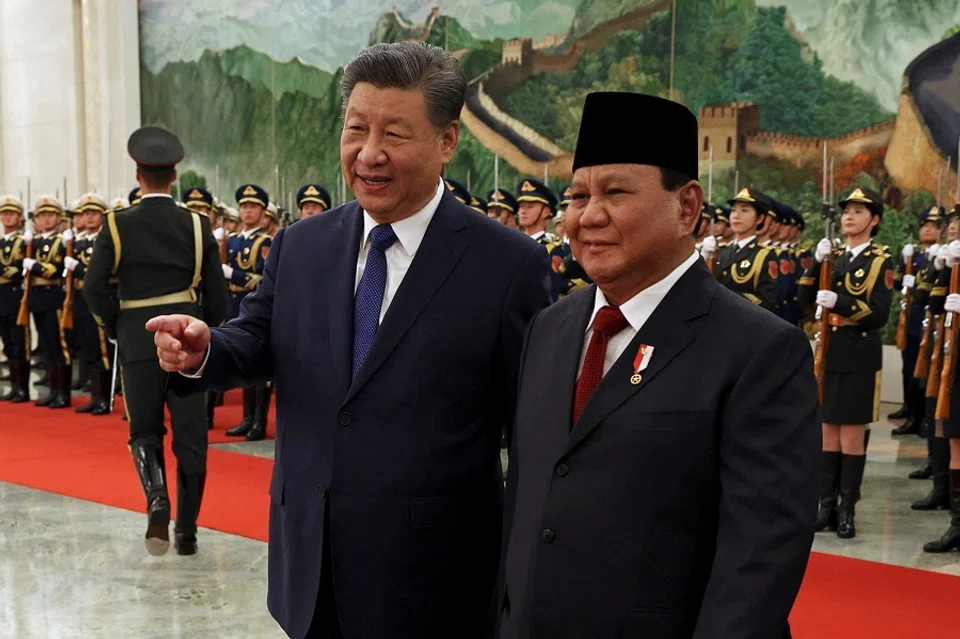Prabowo’s China visit: Implications for the South China Sea
In one sentence, Jakarta appears to have undermined its longstanding position in the South China Sea.

Indonesia’s longstanding position is that it is not a party to the South China Sea dispute because it does not have an overlapping maritime boundary claim with China. In Jakarta’s view, China’s nine-dash line has no legal basis. But the new Prabowo administration might have undermined Jakarta’s position.
Was the apparent U-turn a blunder by Sugiono, Indonesia’s rookie foreign minister? Or was it a calculated move by President Prabowo Subianto to curry favour with China? These are valid questions in the wake of Prabowo’s state visit to China on 9 November, at the end of which Indonesia appeared to acknowledge China’s nine-dash line claims in the South China Sea.
These questions demand answers because they have significant implications for Indonesia’s relations with China and its stance on the South China Sea dispute.
Dual-track China policy
When Prabowo was elected president in February, many observers expected the retired general to pursue a dual-track policy towards China.
The first track was to continue the policy of his predecessor, Joko “Jokowi” Widodo, to increase economic ties between the two countries.
The second track was to push back against Chinese maritime incursions into Indonesia’s exclusive economic zone (EEZ).

China is Indonesia’s largest trade partner and second-largest source of investment. Last year, bilateral trade hit US$130 billion, up 170% from a decade earlier. In 2023 alone, China invested US$7.4 billion in Indonesia. In October 2023, the Chinese-funded Jakarta to Bandung high-speed railway, part of President Xi Jinping’s signature Belt and Road Initiative, opened with much fanfare.
The second track was to push back against Chinese maritime incursions into Indonesia’s exclusive economic zone (EEZ).
China’s nine-dash line, which Beijing uses to claim territorial and jurisdictional rights over more than 80% of the South China Sea, overlaps with Indonesia’s EEZ surrounding the Natuna Islands. Over the years, this area, which is rich in oil, gas, and fisheries, has been the scene of a number of tense run-ins between Indonesia’s and China’s maritime agencies.
A good start but...
With regard to the first track, Prabowo did not disappoint. In April he made his first overseas trip as president-elect (he was also defence minister at the time) to China. Earlier this month, he returned to China on his first overseas trip since his inauguration as president on 20 October and signed deals worth US$10 billion.
On the second track, the Prabowo administration got off to a flying start. The day after Prabowo’s inauguration, vessels belonging to Indonesia’s maritime security coordinating agency, Bakamla, expelled a Chinese Coast Guard (CCG) cutter that had been interfering with the operations of an Indonesian-chartered survey ship near the Natunas. When the CCG vessel returned on 24 and 26 of October, Bakamla ships again escorted it from Indonesia’s EEZ.
If Beijing was using the CCG vessel to test the resolve of Indonesia’s new president in the South China Sea, Prabowo passed with flying colours.
... the two sides had reached an “important common understanding on joint development in areas of overlapping claims and agreed to establish an Inter-Governmental Joint Steering Committee to explore and advance relevant cooperation”.

But within a few weeks, however, his government had well and truly muddied the waters.
A statement overturning Indonesia’s position
According to a joint statement released at the end of his visit to China, the two sides had reached an “important common understanding on joint development in areas of overlapping claims and agreed to establish an Inter-Governmental Joint Steering Committee to explore and advance relevant cooperation”.
In that one sentence, Indonesia appeared to have overturned its long-held position that it was not a party to the South China Sea dispute because it did not have an overlapping maritime boundary claim with China. In Jakarta’s view, China’s nine-dash line has no legal basis. Jakarta underscored this position in May 2020 when it submitted a note verbale to the United Nations in which it stated its stance had been confirmed by the 2016 arbitral tribunal which had ruled the nine-dash line was incompatible with international law.
Indonesia’s foreign ministry was quick to recognise the blunder and issued a corrective which emphasised three points: that any maritime cooperation between Indonesia and China did not mean that Jakarta recognised the nine-dash line; that Indonesia still maintained China’s claims lacked any legal basis; and that cooperation did not affect Indonesia’s sovereignty, sovereign rights or jurisdiction in the Natuna Islands.
So why did the Prabowo administration agree to the text of the joint statement?
Deliberate ploy?
One explanation is that Sugiono, Prabowo’s loyal protege who has little experience in foreign affairs, failed to understand the implications of the statement for the Natuna Islands dispute.
But Sugiono was accompanied by experienced officials from the foreign ministry who surely would have understood the ramifications of the joint statement. Perhaps Sugiono ignored their advice or, on Prabowo’s orders, overruled them.
If it was the latter, perhaps it was a deliberate ploy by Prabowo to improve relations with China.

If it was the latter, perhaps it was a deliberate ploy by Prabowo to improve relations with China. If so, it was completely gratuitous given that, as noted above, economic ties between the two countries have grown significantly despite their maritime dispute.
A few days after his trip to China, Prabowo met with US President Joe Biden. In a damage limitation exercise, their joint statement took note of the 2016 arbitral tribunal ruling.
But it was already too late.
Indonesia had undermined its own legal position and added legitimacy to China’s illegal claims. In future disputes over maritime resources, Chinese officials can now point to the joint statement as Indonesia’s acknowledgement that a dispute exists between the two countries, one that can only be resolved, as China has insisted since the early 1990s, through bilateral negotiations.
Consequently, we can expect the CCG and Chinese fishing boats to return to the waters off the Natuna Islands.
Prabowo’s preference for a more hands-on approach risks sidelining the country’s diplomats and undermining Indonesia’s national interests.
Indonesia has long maintained the fiction that it is not a party to the South China Sea dispute. It has now, inadvertently or otherwise, recognised that it is, but at great cost to its principled position and without any substantive gains.
Jokowi was often criticised for his hands-off attitude to foreign affairs, preferring the foreign ministry to take the lead instead. Prabowo’s preference for a more hands-on approach risks sidelining the country’s diplomats and undermining Indonesia’s national interests.
This article was first published in Fulcrum, ISEAS - Yusof Ishak Institute’s blogsite.





